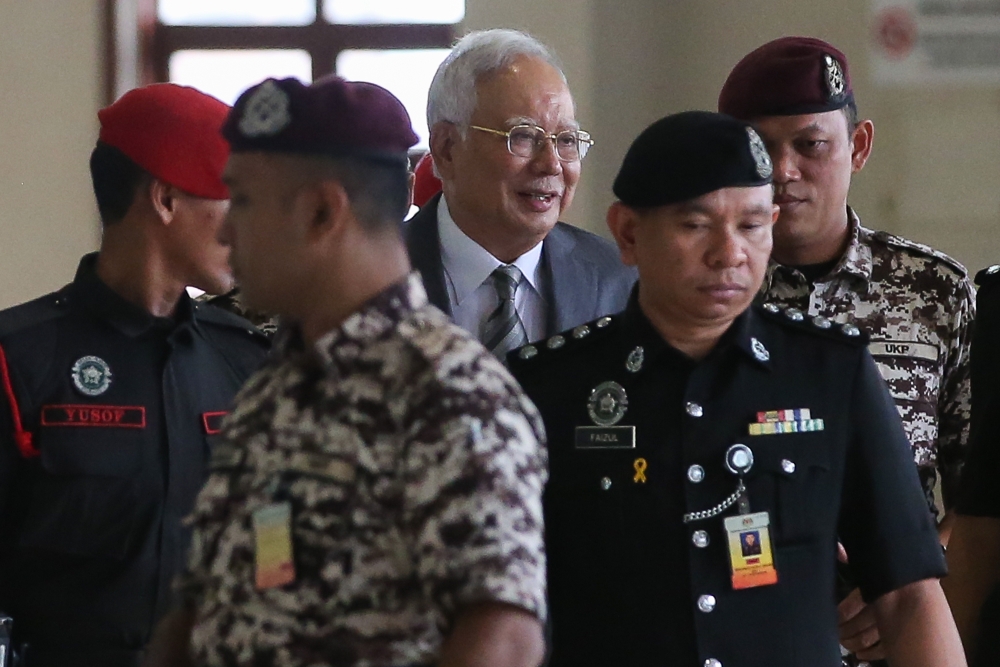
JANUARY 14 — In Dato’ Sri Mohd Najib bin Hj Abd Razak v Public Prosecutor [2019] 4 MLJ 281, the facts were straightforward.
The accused was charged in the High Court with the commission of various offences including money-laundering and corruption. He applied by way of a notice of motion for a pre-trial gag order — to last until the proceedings were disposed of — to prevent anyone from publishing, broadcasting or communicating in any manner whatsoever to the public any words, comments, discussions or statements which might suggest, conclude or infer that he was guilty of the offences concerned.
The trial court dismissed the application. The learned judge considered as follows:
- even if a gag order was granted it could not be enforced against the world at large;
- the accused had not shown an immediate threat of a real and substantial risk of serious prejudice to the administration of justice if the order was not granted;
- the accused himself had given public interviews to answer the allegations against him;
- the application gave greater priority to the accused’s interests than to the competing interests of freedom of speech and expression and the ‘open justice’ system; and
- the accused had other legal remedies that were available to him, such as defamation and contempt laws, which he could initiate against anyone who had adversely affected his right to a fair trial or offended the sub judice rule.


On appeal to the Court of Appeal, the appellate court dismissed the accused’s appeal and affirmed the trial court’s decision including its view that the sub judice rule still applied in Malaysia notwithstanding the fact jury trials had been abolished in the country.
On further appeal to the Federal Court, the apex court unanimously dismissed the appeal and affirmed the decision of the Court of Appeal.
In dismissing the appeal, the Federal Court ruled, through Chief Justice Richard Malanjum who delivered the judgment of the apex court, as follows:
- The authorities showed that an applicant for a pre-emptive gag order must prove that: (a) there was a real and substantial risk to the fairness of the trial; (b) there were no adequate alternative measures to remedy that risk; and (c) the gag order was a necessary and proportionate step to protect the accused’s right to a fair trial.
- The accused did not disclose any obvious or imminent threat to a fair trial. The accused had also admitted to giving statements to the press to answer the allegations against him. In the circumstances, since the accused had had the opportunity to present his side of the story, so to speak, there was a balanced narrative of competing perspectives on the matter and, hence, there was no real and substantial risk to the fairness of the trial.
- The refusal of a pre-emptive gag order would not deprive the accused of the right to a fair trial given that he had recourse to the laws of defamation and to committal proceedings for contempt of court in the event any party offended the rule against sub judice. The courts were well equipped to safeguard the accused’s right to a fair trial even without resorting to the grant of a pre-emptive gag order.
- The accused failed to satisfy the criteria of ‘necessity’ and proportionality’ in his application. He was applying to cast a blanket ban on all communications prejudicial to him. It would be impossible to enforce a gag order over foreign media outlets which were beyond the jurisdiction of the Malaysian courts. If an order in terms of the accused’s application was granted it would create a situation where local news outlets would be effectively censored while their foreign counterparts would enjoy free rein over what to report. This was plainly untenable. Moreover, the allegations against the accused had been circulating in the public domain for some time and it was pointless for the court to attempt to regulate the same.
- The Court of Appeal did not commit any misdirection of law or fact that warranted appellate intervention. The courts below were correct in finding that our courts had the requisite authority to grant a prior restraint gag order in the exercise of their power to punish for contempt. In other words, Article 126 of the Federal Constitution was not merely an enabling provision to punish for contempt but was wide enough to allow the issuance of a prior restraint gag order in an appropriate case.
Towards the end of his judgment, the Chief Justice said:
"If we grant an order in terms of the [accused]’s notice of motion, it [will] create a situation where local news outlets are effectively censored while their foreign counterparts enjoy free rein over what to report. This is plainly untenable.
"Moreover, the allegations against the [accused] have been circulating in the public domain for some time and it would be pointless for us to attempt to regulate the same.
"Based on the above, we conclude that the [accused] has failed to satisfy the criteria of ‘necessity’ and ‘proportionality’ in his application for a prior restraint gag order. We accordingly uphold the findings of both lower courts on this point.”
The accused’s application for a gag order was dismissed by all three superior courts of the country.
But let the public beware that it is still open for committal proceedings for contempt of court in the event any party offends the rule against sub judice.
As the Chief Justice duly reminded, the courts are well-equipped to safeguard against the risk of prejudice to the administration of justice even without resorting to the grant of a pre-emptive gag order.
You May Also Like

